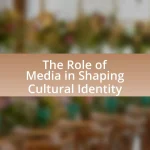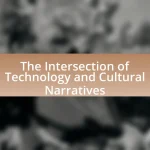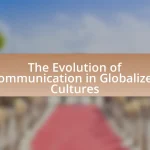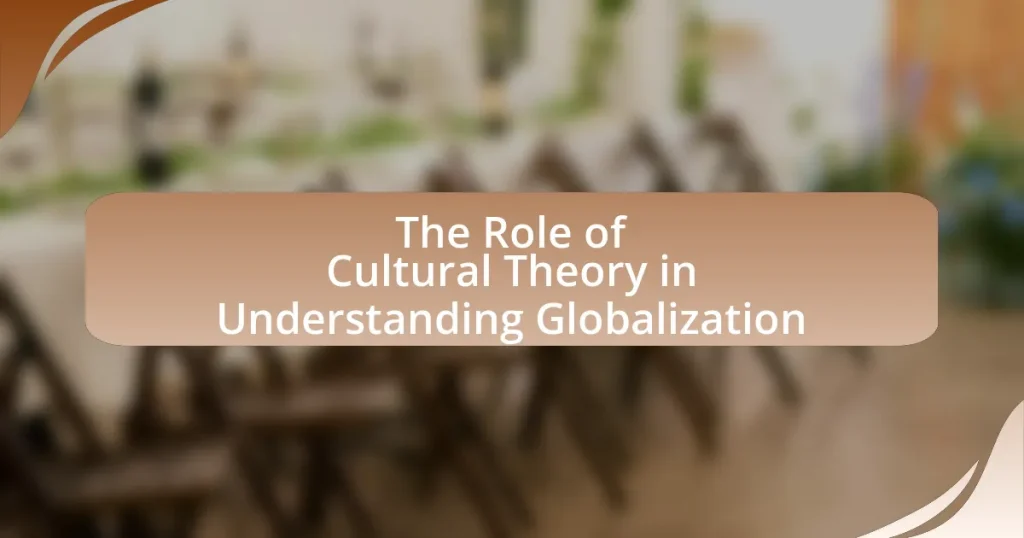Cultural theory is essential for understanding globalization, as it provides frameworks to analyze the interplay between cultural exchanges, social identities, and power dynamics across borders. The article explores key concepts such as hybridity, cultural imperialism, and glocalization, illustrating how local cultures adapt to global influences. It emphasizes the significance of cultural narratives in shaping perceptions of globalization and highlights the importance of cultural context in studying global interactions. Additionally, the article examines various cultural theories, including cultural homogenization and postcolonial theory, and discusses their implications for policy-making and cross-cultural dialogue in a globalized world.
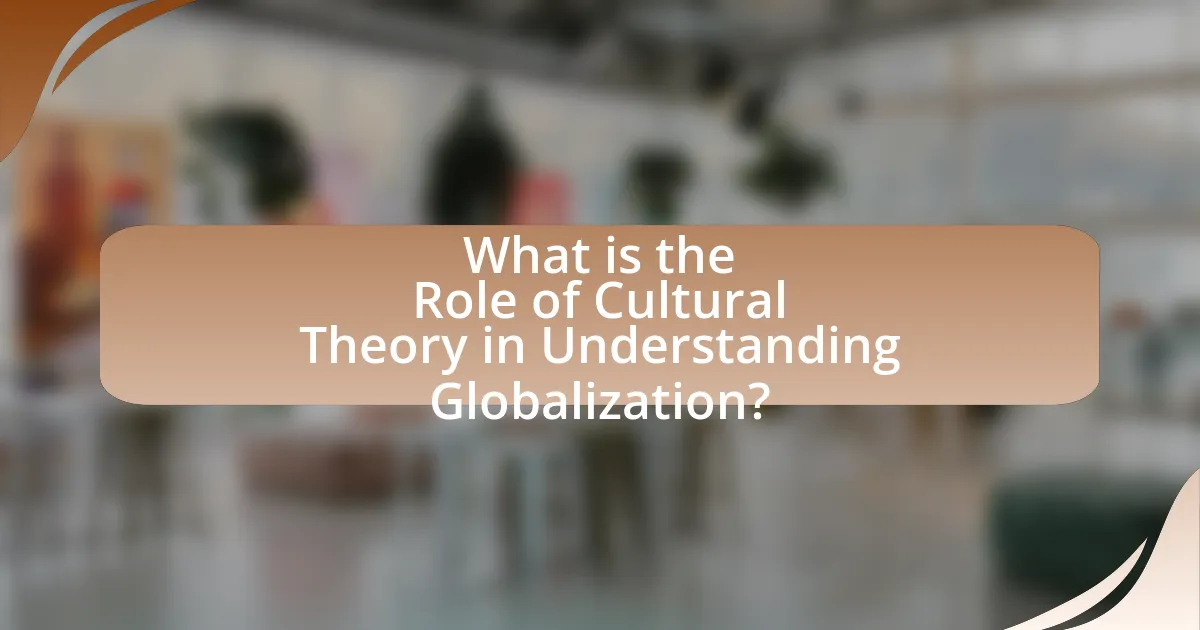
What is the Role of Cultural Theory in Understanding Globalization?
Cultural theory plays a crucial role in understanding globalization by providing frameworks to analyze how cultural exchanges shape social identities and power dynamics across borders. It emphasizes the significance of cultural narratives, symbols, and practices in influencing global interactions, highlighting that globalization is not merely an economic or political phenomenon but also a cultural one. For instance, cultural theorists like Arjun Appadurai argue that globalization leads to the formation of “ethnoscapes,” where the movement of people and ideas creates new cultural landscapes that challenge traditional notions of identity and belonging. This perspective underscores the importance of cultural context in interpreting global processes, demonstrating that cultural theory is essential for comprehending the complexities of globalization.
How does cultural theory contribute to our understanding of globalization?
Cultural theory enhances our understanding of globalization by providing frameworks to analyze how cultural practices and identities are shaped by global interactions. It emphasizes the role of culture in the processes of globalization, illustrating how local cultures adapt, resist, or transform in response to global influences. For instance, cultural theorists like Arjun Appadurai have introduced concepts such as “ethnoscapes” and “mediascapes,” which highlight the fluidity of cultural exchanges and the impact of media on cultural perceptions across borders. This theoretical lens allows for a nuanced examination of globalization, revealing that it is not merely an economic or political phenomenon but also a deeply cultural one, where power dynamics and cultural identities are continuously negotiated and redefined.
What are the key concepts of cultural theory relevant to globalization?
Key concepts of cultural theory relevant to globalization include hybridity, cultural imperialism, and glocalization. Hybridity refers to the blending of cultures resulting from globalization, where local and global influences create new cultural forms. Cultural imperialism highlights the dominance of certain cultures over others, often leading to the erosion of local cultures due to the spread of global media and consumerism. Glocalization describes the adaptation of global products and ideas to fit local cultures, emphasizing the interplay between global and local dynamics. These concepts illustrate how cultural theory provides a framework for understanding the complexities of cultural interactions in a globalized world.
How do cultural narratives shape perceptions of globalization?
Cultural narratives significantly shape perceptions of globalization by framing how individuals and communities interpret global interactions and influences. These narratives, which are often rooted in historical experiences, social values, and collective identities, influence attitudes toward foreign cultures, economic exchanges, and political relationships. For instance, narratives that emphasize cultural homogenization may lead to resistance against globalization, as seen in movements advocating for local traditions and identities, while narratives highlighting cultural exchange can foster acceptance and enthusiasm for global interconnectedness. Research by Arjun Appadurai in “Modernity at Large” illustrates how cultural narratives can create a sense of belonging or alienation in a globalized world, demonstrating their powerful role in shaping public perceptions and responses to globalization.
Why is cultural context important in globalization studies?
Cultural context is important in globalization studies because it shapes how individuals and societies interpret and respond to global processes. Understanding cultural context allows researchers to analyze the diverse impacts of globalization on local traditions, values, and identities, which can vary significantly across different regions. For instance, a study by Arjun Appadurai in “Modernity at Large” highlights how cultural flows influence local responses to globalization, demonstrating that cultural context is crucial for comprehending the complexities of global interactions. This understanding helps in identifying both the opportunities and challenges that globalization presents to various cultures, ensuring a more nuanced analysis of its effects.
How do local cultures interact with global influences?
Local cultures interact with global influences through a dynamic process of adaptation and negotiation. This interaction often results in the blending of local traditions with global trends, leading to cultural hybridization. For example, the global spread of fast food has been met with local adaptations, such as the incorporation of regional flavors and ingredients, which reflects how local cultures can modify global influences to fit their unique contexts. Research by Arjun Appadurai in “Modernity at Large” highlights how globalization fosters cultural exchanges that allow local identities to evolve while still maintaining distinct characteristics. This demonstrates that local cultures are not passive recipients of global influences but active participants in shaping their cultural landscapes.
What role do cultural identities play in the globalization process?
Cultural identities significantly influence the globalization process by shaping how societies interact and integrate with one another. These identities provide a framework through which individuals and communities interpret global influences, leading to either the adoption of new practices or the reinforcement of traditional values. For instance, the spread of global brands often encounters local cultural resistance, as seen in the backlash against fast food chains in various countries, where local culinary traditions are prioritized over foreign offerings. This dynamic illustrates that cultural identities can both facilitate and hinder globalization, as they dictate the extent to which global ideas are embraced or rejected.
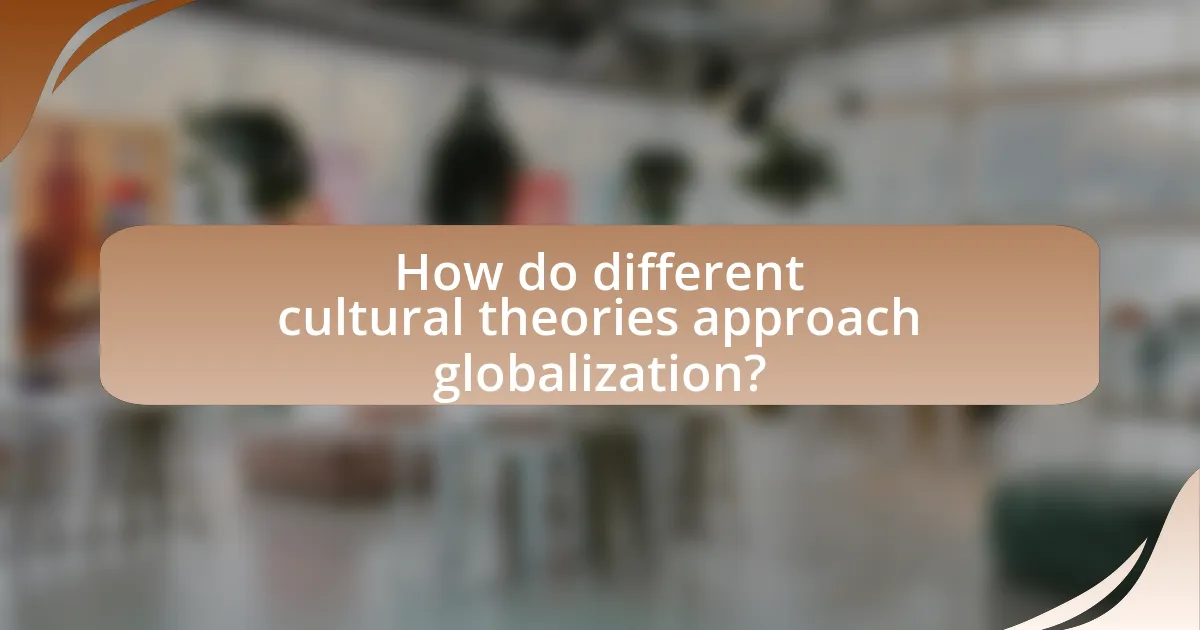
How do different cultural theories approach globalization?
Different cultural theories approach globalization by examining how cultural identities and practices are transformed through global interactions. For instance, cultural homogenization theory posits that globalization leads to a uniform global culture, often dominated by Western values, which can erode local traditions. In contrast, cultural hybridization theory suggests that globalization results in the blending of cultures, creating new, hybrid identities that reflect both local and global influences. Additionally, postcolonial theory critiques globalization by highlighting power dynamics and the historical context of colonialism, emphasizing how global processes can perpetuate inequalities. These theories collectively illustrate the complex interplay between global forces and local cultures, demonstrating that globalization is not a one-dimensional process but rather a multifaceted phenomenon shaped by various cultural perspectives.
What are the main cultural theories that analyze globalization?
The main cultural theories that analyze globalization include cultural homogenization, cultural hybridization, and cultural imperialism. Cultural homogenization posits that globalization leads to a uniform global culture, often dominated by Western values and practices, as seen in the widespread adoption of Western media and consumer products. Cultural hybridization suggests that globalization results in the blending of cultures, creating new, hybrid forms of cultural expression, exemplified by the fusion of musical genres across different cultures. Cultural imperialism argues that globalization perpetuates power imbalances, where dominant cultures impose their values on marginalized cultures, leading to cultural erosion. These theories provide frameworks for understanding the complex interactions between global and local cultures in the context of globalization.
How does postcolonial theory critique globalization?
Postcolonial theory critiques globalization by highlighting the power imbalances and cultural hegemony that arise from colonial histories. This theoretical framework argues that globalization often perpetuates neocolonial practices, where Western nations dominate economic and cultural narratives, marginalizing non-Western voices. For instance, scholars like Edward Said in “Orientalism” illustrate how Western representations of the East reinforce stereotypes and justify exploitation. Additionally, postcolonial theorists emphasize that globalization can lead to cultural homogenization, erasing local identities and traditions in favor of a dominant global culture. This critique is supported by evidence of economic disparities and cultural appropriation that continue to affect formerly colonized nations, demonstrating the ongoing impact of colonial legacies in contemporary global interactions.
What insights does cultural relativism provide regarding globalization?
Cultural relativism offers critical insights into globalization by emphasizing the importance of understanding cultural practices and beliefs within their own contexts rather than imposing external standards. This perspective highlights that globalization can lead to cultural homogenization, where dominant cultures overshadow local traditions, potentially resulting in the loss of cultural diversity. For instance, the spread of Western consumer culture often marginalizes indigenous practices, as seen in various regions where local customs are replaced by global brands. By advocating for the appreciation of diverse cultural frameworks, cultural relativism encourages a more equitable approach to globalization that respects and preserves cultural identities.
How do cultural theories differ in their perspectives on globalization?
Cultural theories differ in their perspectives on globalization primarily through their interpretations of cultural exchange and identity. For instance, cultural homogenization theory posits that globalization leads to a uniform global culture, often dominated by Western values, which can erode local traditions. In contrast, cultural hybridization theory argues that globalization fosters the mixing of cultures, resulting in new, hybrid identities that retain elements of both local and global influences. Additionally, postcolonial theory critiques globalization by highlighting power dynamics and the historical context of colonialism, emphasizing how globalization can perpetuate inequalities. These differing perspectives illustrate the complexity of globalization’s impact on culture, as evidenced by the varying outcomes in different regions and communities.
What are the strengths and weaknesses of each cultural theory in understanding globalization?
Cultural theories provide various frameworks for understanding globalization, each with distinct strengths and weaknesses.
-
Cultural Imperialism Theory: This theory highlights the dominance of Western culture over others, emphasizing the impact of media and consumerism. Its strength lies in its ability to explain cultural homogenization and the loss of local identities. However, its weakness is that it can oversimplify complex cultural exchanges and ignore instances of cultural resistance and adaptation.
-
Cultural Hybridization Theory: This theory focuses on the blending of cultures, showcasing how globalization leads to new cultural forms. Its strength is in illustrating the dynamic nature of culture and the agency of individuals in creating hybrid identities. Conversely, its weakness is that it may downplay the power imbalances that exist in cultural exchanges, potentially romanticizing the process of cultural mixing.
-
World-Systems Theory: This theory situates cultural phenomena within the broader context of economic and political structures, emphasizing the role of global capitalism. Its strength is in linking cultural practices to economic conditions, providing a comprehensive view of globalization. However, its weakness is that it can neglect the nuances of local cultures and the subjective experiences of individuals.
-
Postcolonial Theory: This theory examines the effects of colonialism on cultures and identities, highlighting issues of power and representation. Its strength is in addressing historical injustices and the ongoing impact of colonial legacies. The weakness lies in its potential to focus excessively on victimhood, which may obscure the agency of postcolonial societies in shaping their cultural narratives.
-
Globalization Theory: This theory encompasses various perspectives on how globalization affects culture, including economic, political, and social dimensions. Its strength is in its inclusivity and adaptability to different contexts. However, its weakness is that it can become too broad and lack specificity, making it challenging to apply in concrete situations.
Each cultural theory offers valuable insights into globalization, but they also have limitations that must be considered for a comprehensive understanding.
How do these theories inform policy-making in a globalized world?
Cultural theories inform policy-making in a globalized world by providing frameworks that help policymakers understand diverse cultural contexts and their implications for governance. For instance, theories such as cultural relativism emphasize the importance of recognizing local customs and values, which can lead to more effective and culturally sensitive policies. This approach is supported by evidence from various international development projects that have succeeded when they aligned with local cultural practices, such as the World Bank’s initiatives in community-driven development, which showed improved outcomes when local cultural contexts were integrated into policy design. Thus, cultural theories enhance the relevance and effectiveness of policies in a globalized environment by promoting inclusivity and understanding of cultural dynamics.

What are the implications of cultural theory for global interactions?
Cultural theory significantly influences global interactions by shaping how societies perceive and engage with one another. This framework helps to understand the complexities of cultural identities, power dynamics, and communication styles that affect international relations. For instance, cultural theory posits that differing cultural values can lead to misunderstandings and conflicts, as seen in the clash of civilizations theory proposed by Samuel Huntington, which argues that cultural differences are a primary source of conflict in the post-Cold War world. Additionally, cultural theory emphasizes the importance of cultural exchange and hybridity, which can foster cooperation and mutual understanding among nations, as evidenced by the rise of global cultural movements that transcend borders. Thus, cultural theory provides essential insights into both the challenges and opportunities present in global interactions.
How does cultural theory influence global communication?
Cultural theory significantly influences global communication by shaping how individuals and societies interpret messages across diverse cultural contexts. This influence manifests through frameworks that highlight the importance of cultural norms, values, and symbols in communication processes. For instance, Edward Hall’s high-context and low-context communication theory illustrates how cultures vary in their reliance on explicit verbal communication versus contextual cues, affecting international interactions. Additionally, Geert Hofstede’s cultural dimensions theory provides insights into how cultural differences, such as individualism versus collectivism, impact communication styles and expectations in global exchanges. These theories underscore the necessity for cultural awareness and sensitivity in fostering effective communication in an increasingly interconnected world.
What are the effects of cultural misunderstandings in global interactions?
Cultural misunderstandings in global interactions lead to miscommunication, conflict, and reduced collaboration. These misunderstandings can result in negative perceptions and stereotypes, which hinder effective dialogue and cooperation among diverse groups. For instance, a study by Hofstede Insights highlights that cultural dimensions, such as individualism versus collectivism, can significantly impact business negotiations and team dynamics. When parties fail to recognize and adapt to these cultural differences, it can lead to failed partnerships and economic losses, as evidenced by the 70% of international joint ventures that do not achieve their intended goals due to cultural clashes.
How can cultural theory enhance cross-cultural dialogue?
Cultural theory enhances cross-cultural dialogue by providing frameworks that facilitate understanding of diverse cultural perspectives. These frameworks, such as Edward Said’s concept of Orientalism, illustrate how cultural narratives shape perceptions and interactions between different groups. By recognizing these narratives, individuals can engage in more meaningful conversations that acknowledge and respect cultural differences, ultimately fostering empathy and collaboration. Research indicates that applying cultural theory in dialogue settings leads to improved communication outcomes, as it encourages participants to reflect on their own biases and assumptions, thereby promoting a more inclusive dialogue.
What practical applications arise from cultural theory in globalization?
Cultural theory in globalization has practical applications in areas such as international marketing, policy-making, and intercultural communication. For instance, businesses utilize cultural theory to tailor marketing strategies that resonate with diverse cultural values and consumer behaviors, enhancing market penetration and brand loyalty. Research by Hofstede (1980) on cultural dimensions illustrates how understanding cultural differences can lead to more effective communication and negotiation strategies in international business. Additionally, policymakers apply cultural theory to design inclusive policies that consider the cultural contexts of various communities, promoting social cohesion and effective governance. These applications demonstrate the relevance of cultural theory in navigating the complexities of globalization.
How can businesses leverage cultural theory to succeed in global markets?
Businesses can leverage cultural theory to succeed in global markets by understanding and adapting to the cultural nuances of different regions. This involves conducting thorough cultural assessments to identify values, beliefs, and behaviors that influence consumer preferences. For example, Hofstede’s cultural dimensions theory highlights how individualism versus collectivism affects marketing strategies; in collectivist cultures, businesses may focus on community-oriented messaging. Additionally, research by Trompenaars and Hampden-Turner emphasizes the importance of recognizing cultural context in negotiation styles, which can enhance relationship-building and trust. By integrating these insights into their strategies, businesses can tailor their products, marketing, and customer engagement to resonate with local audiences, ultimately driving success in diverse markets.
What strategies can policymakers adopt based on cultural theory insights?
Policymakers can adopt strategies that align with the four cultural types identified in cultural theory: individualism, egalitarianism, hierarchy, and fatalism. By understanding these cultural perspectives, policymakers can tailor their approaches to better resonate with different societal values. For instance, in individualistic cultures, strategies that promote personal freedom and market-driven solutions are effective, while in egalitarian cultures, policies emphasizing social equity and community welfare are more appropriate. Hierarchical cultures may respond better to structured policies that reinforce authority and stability, whereas fatalistic cultures might require strategies that acknowledge uncertainty and provide safety nets. This approach is supported by research indicating that culturally informed policies lead to higher public acceptance and effectiveness, as seen in various case studies across different nations.
What are best practices for applying cultural theory in understanding globalization?
Best practices for applying cultural theory in understanding globalization include integrating diverse cultural perspectives, analyzing power dynamics, and recognizing the impact of local contexts on global processes. Integrating diverse cultural perspectives allows for a more comprehensive understanding of how globalization affects different communities, as evidenced by the work of Arjun Appadurai, who emphasizes the importance of “scapes” in global cultural flows. Analyzing power dynamics is crucial, as cultural theory often reveals how globalization can reinforce or challenge existing hierarchies, supported by the insights of Michel Foucault on power relations. Recognizing local contexts ensures that global theories are not applied uniformly, acknowledging that local cultures adapt and respond uniquely to global influences, as demonstrated in studies of cultural hybridity by Homi K. Bhabha. These practices collectively enhance the understanding of globalization through a culturally informed lens.


